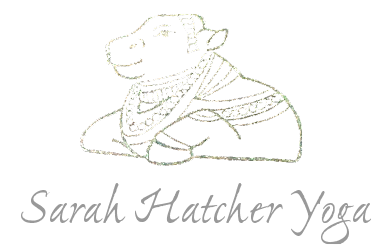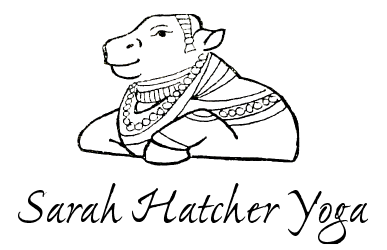Svadhyaya
Keeping a practice journal (or even a blog) may reveal all your secrets that are hidden in the yoga practice. Once I let the ink take over, they pour out onto the paper. This type of exposure allows you to accept what has happened and where you are now - and this is a great taste of what the yamas and niyamas are all about.
Writing and sharing your practice: reading your own voice of the practice is like watching yourself do a self practice. There is a sense of ownership and wonderment about what you are practicing. What is often revealed is how the medicine of yoga is actually working. Sometimes information comes out in letters to friends and teachers, too.
Janu Sirsasana A-C, for example. When I first started to write about my practice, I had a sweet crush on these asanas. Some days we would fight as my toes were crunching...other days I would feel a truce as the A-C exposure led my hips towards greater sensibility.
Once you start writing about what you are actually feeling on the mat, you can notice how you are handling your emotions when you are practicing yoga. Are they always in check? Are you a bomb waiting to go off because you are repressing something that wants to come out? Or are you one who melts down during your practice? Are you totally flat, moving methodically through the yoga asanas with nothing, nothing happening on the inside?
We all know that each Series has a dragon that lives in each one, maybe more than one, even. We have plenty of meditative tools to face these 'dragons'. Breath, bandha, dristhi, vinyasa, dharana...but more than the practice tools we have devotion and passion to practice.
You are forced to do something with these emotions. This anger, meltdown, obsession (whatever it may be) then becomes a guide which leads you towards compassion. These terrible asanas then become more like loved rivals as you dig deeper and deeper towards understanding them - and understanding yourself. This passion for understanding (Union!) is what cracks us open, and exposes us.
These demons also challenge our egos, our sense of "I"-ness and our entire beings of whom we think we are. It is no wonder that some days while practicing karandavasana I often wink after all my hard three tries, "Till next time, sweet wee duck, thank you for kicking my !$*(#!"
Sometimes in baddha konasana I enter this posture as if I were going into a cave, into a place of worship. During this posture one dives into the hips and into the pelvis, and if we are sensing each and every breath, we become softer and kinder to those around us - sharing the forgiveness and tenderness we found within ourselves with others.
Then in the advanced series (A), there are all sorts of recluse demons hanging out around every bend in the road: Virancha, Durva...Kukku...Bhaka...so many monsters in this one to make you fearless, to soften and harden you, to burn out any kleshas. For good. And I often meet them at the door with my best team.
If we aren't experiencing an emotional exposure from our practices (I mean any practice - no matter whether they be a daily practice of Sun Salutations only, or a long vigorous advanced practice), then I believe we are missing the point of yoga. Work out the problems you have with those enemies and iron them out. For the asanas that you are having problems with, some serious therapy (research and study) may be the medicine.
If you are a flatliner, or are experiencing a lull in your practice, try giving your practice a wee break from asana (tone it down, do less) and add in some study and philosophy to your daily asana?
Sutra 2.1 offers svadhyaya - self and spiritual study - as a full yogic practice in itself. Patanjali also includes svadhyaya in the niyamas - the second limb of ashtanga yoga. Since svadhyaya is a part of the niyamas, this suggests it is worth our effort to include them into our study of yoga. And on a daily basis. So if we are cleaning our bodies and minds on the mat through asana, then why not clear out what is left upstairs through writing and self reflection then, too?
Philosophy of Yoga and chanting the YS of Patanjali - Fridays and Sundays at AYE - join me!
From Rumi:
The Guest House
This being human is a guest house
Every morning a new arrival.
A joy, depression, a meanness
some momentary awareness comes
as an unexpected visitor!
Welcome them and entertain them all!
Even if they're a crowd of sorrows
who violently sweep your house
empty of it's furniture
still, treat each guest honorably.
He may be clearing you out for some new delight.
The dark thought, the shame, the malice
meet them at the door laughing,
and invite them in.
Be grateful for whoever comes,
because each has been sent
as a guide from beyond.
Writing and sharing your practice: reading your own voice of the practice is like watching yourself do a self practice. There is a sense of ownership and wonderment about what you are practicing. What is often revealed is how the medicine of yoga is actually working. Sometimes information comes out in letters to friends and teachers, too.
Janu Sirsasana A-C, for example. When I first started to write about my practice, I had a sweet crush on these asanas. Some days we would fight as my toes were crunching...other days I would feel a truce as the A-C exposure led my hips towards greater sensibility.
Once you start writing about what you are actually feeling on the mat, you can notice how you are handling your emotions when you are practicing yoga. Are they always in check? Are you a bomb waiting to go off because you are repressing something that wants to come out? Or are you one who melts down during your practice? Are you totally flat, moving methodically through the yoga asanas with nothing, nothing happening on the inside?
We all know that each Series has a dragon that lives in each one, maybe more than one, even. We have plenty of meditative tools to face these 'dragons'. Breath, bandha, dristhi, vinyasa, dharana...but more than the practice tools we have devotion and passion to practice.
You are forced to do something with these emotions. This anger, meltdown, obsession (whatever it may be) then becomes a guide which leads you towards compassion. These terrible asanas then become more like loved rivals as you dig deeper and deeper towards understanding them - and understanding yourself. This passion for understanding (Union!) is what cracks us open, and exposes us.
These demons also challenge our egos, our sense of "I"-ness and our entire beings of whom we think we are. It is no wonder that some days while practicing karandavasana I often wink after all my hard three tries, "Till next time, sweet wee duck, thank you for kicking my !$*(#!"
Sometimes in baddha konasana I enter this posture as if I were going into a cave, into a place of worship. During this posture one dives into the hips and into the pelvis, and if we are sensing each and every breath, we become softer and kinder to those around us - sharing the forgiveness and tenderness we found within ourselves with others.
Then in the advanced series (A), there are all sorts of recluse demons hanging out around every bend in the road: Virancha, Durva...Kukku...Bhaka...so many monsters in this one to make you fearless, to soften and harden you, to burn out any kleshas. For good. And I often meet them at the door with my best team.
If we aren't experiencing an emotional exposure from our practices (I mean any practice - no matter whether they be a daily practice of Sun Salutations only, or a long vigorous advanced practice), then I believe we are missing the point of yoga. Work out the problems you have with those enemies and iron them out. For the asanas that you are having problems with, some serious therapy (research and study) may be the medicine.
If you are a flatliner, or are experiencing a lull in your practice, try giving your practice a wee break from asana (tone it down, do less) and add in some study and philosophy to your daily asana?
Sutra 2.1 offers svadhyaya - self and spiritual study - as a full yogic practice in itself. Patanjali also includes svadhyaya in the niyamas - the second limb of ashtanga yoga. Since svadhyaya is a part of the niyamas, this suggests it is worth our effort to include them into our study of yoga. And on a daily basis. So if we are cleaning our bodies and minds on the mat through asana, then why not clear out what is left upstairs through writing and self reflection then, too?
Philosophy of Yoga and chanting the YS of Patanjali - Fridays and Sundays at AYE - join me!
From Rumi:
The Guest House
This being human is a guest house
Every morning a new arrival.
A joy, depression, a meanness
some momentary awareness comes
as an unexpected visitor!
Welcome them and entertain them all!
Even if they're a crowd of sorrows
who violently sweep your house
empty of it's furniture
still, treat each guest honorably.
He may be clearing you out for some new delight.
The dark thought, the shame, the malice
meet them at the door laughing,
and invite them in.
Be grateful for whoever comes,
because each has been sent
as a guide from beyond.

